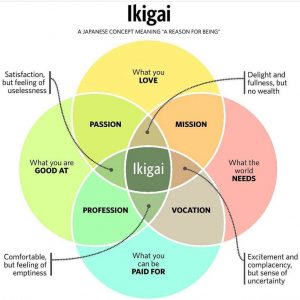
We’re constantly learning more and more from neuroscience about how the brain works, what it likes and what it doesn’t like, and why it is so important to find and define our niche, and to get clear on our messaging in order to effectively market our coaching practices.
Why do our brains like it when we niche?
Neuro-marketing tells us 3 things about the brain that clearly signify why finding and defining our niche and our brand messaging is SO important. One of the golden rules that we need to keep front or mind (if we do nothing else as marketers) is to remember that the confused mind says: “NO”!
And that’s the last thing that we want.
I’ve spoken before about one of our biggest challenges with marketing coaching, being that we are trying to market and sell something that is essentially intangible and hard to quantify. In fact, debates RAGE over how to prove return on investment or whatever terms takes your fancy. They’re all essentially the same thing masquerading under different names – we’re trying to convince our clients why they should buy from us or use us again.
But today I’m going to share with you three of the newest scientific facts about the brain and how knowing this will help you in terms of how you market your practice from a fantastic book that I’ve just finished reading, The Buying Brain by Dr A.K. Pradeep.
If you define and find your niche, there are three effects that science tells us why defining your niche makes marketing your practice so much more effective and makes it easier for your clients to decide to work with you instead of someone else.
There are three things that the brain doesn’t like:
- The brain doesn’t like clutter,
- Our brains get frustrated by messages that take too long to decode, and
- Our brains get enormously frustrated by issues that take too long to resolve.
Now, how does this impact on, or why is this relevant in terms of marketing, our coaching practice?
Let’s start with the first one: our brains don’t like clutter. I don’t have to tell you how distracting it is to work at a messy desk, do I? In fact, there are very few of us who CAN work at a cluttered desk without getting distracted and needing to put at least ONE thing in its proper place.
There’s been enormous research recently on multitasking and just how distractions like our cell phones, emails, having to deal with multiple things at any one time, and so on actually reduce our overall effectiveness, productivity and decision-making abilities that up to 50%.
Do you think that being half as effective is something to pat ourselves on the back for?
In fact, Mihaly Csikszentmihalyi’s concept of Flow has spurned studies that it takes at least 20 minutes to get BACK into a state of flow, if our state of flow is disrupted. So not only do we lose half of our productivity and effectiveness, but it takes 20 minutes at least to get back to optimal productivity and effectiveness.
My friend, I hate to tell you, but your client is LONG gone by now!
So, this makes having a nice and clear marketing message without any fluff or distractions a sensible strategy. Most of all, the following personal example might illustrate this more powerfully.
When I first started coaching back in 2002, I was all over the place. I got my basic coaching, training (and there really wasn’t a lot of choice in those days), and then over the years, I also became trained in a couple of other frameworks, models, modalities and approaches, but I was pretty much all over the place.
One of the problems with coaching and coaches is that – as I mentioned before – we are trying to sell something that is essentially a complete, intangible. So, it’s important that we are able to say to our clients, this is what we do, this is where we are effective, this is where we will help you get the best results and these are the outcomes that we that that you will experience as a result of working with me.
Because I was so over the place and, and kind of unfocused, my business suffered as a result. I could reel off a string of qualifications, but they actually meant diddly squat to my potential clients who didn’t understand the lingo and the code that we get so used to using without a second thought.
So what changed? Over the years, I started to notice a particular pattern in the types of clients allows working with. And I started to notice a particular pattern to the challenges and issues that people were bringing to the coaching session, as well as this hard to express pattern that the coaching intervention would inevitably follow.
So I made a point of noting this, and separating this information so that I could process it into a more clearly defined niche and start to define and refine WHO I wanted to work with, who I work BEST with, and who had delivered the most effective results with.
I realised that we really can’t be all things to all people. We actually don’t want to be all things to all people and I think we need to resist the temptation to want to try and please everyone and do business with everyone: we have to stand for something.
The second thing that our brains DON’T like is that they get frustrated by messages that take too long to decode.
Personally, I love information. I love lots of lots of detail, and I can be very frustrating to listen to because I also repeat something, if I think it’s an important point. So in the early days, I used to just kind of overwhelm people with information. I just want to blurt it all out and make sure that they really, really understood what coaching was, but without giving my poor clients an opportunity to tell me what they were interested in, and what answers they needed and how I might be able to help them.
It made it very difficult for my potential clients to sit through everything and make a decision about whether or not they wanted to work with me. What changed was when I started to get crystal clear and laser focused on the work that I do, and only give the headlines before handing over to my clients to explain their needs and situations.
I’ve got a quick, brief, concise introduction I that I can give that sparks people’s interest – which is important as it’s part of the real craft and artistry of defining your niche – but it sparks my potential clients’ interest enough to want to know more and then the rest is up to them.
The ball is in their court and they can then ask me to tell them more, that they’d like to know more about x, y and z. From there on in my clients’ court and the agenda. They’re the ones who set the agenda.
Now, the third thing that our brains don’t like is tasks that take too long to resolve. And one of the common schools of thought in coaching is that we are experts in coaching when we don’t have to be experts in our clients’ business. And while this has it’s place, and I agree with it, I support that perspective, I still firmly believe that we need to be able to tell our potential clients that we are experts in working with people who are experiencing certain types of situations, people who need to overcome particular challenges, that we are able to deliver effective results and have kind of testimonial, proof, or social proof that we deliver results in a particular area.
So, when I started to position myself very firmly in a particular way, all of a sudden, I started to see an increase in the volume of clients that I was getting. And it was much easier and simpler for me to get clients. I was able to translate my messaging and the stuff that I communicated on into any marketing platform, whether it was public speaking or online, and it became clearer and more relevant to people who were on the receiving end as I developed my focus.
So, again, we don’t want our clients to have to take too long to make a decision to resolve that decision-making task. And again, that is why finding and defining your niche makes things so much easier for clients to make a decision.
So just to give very, very quick recap: it makes sense to find and define your niche and get really, really clear on your marketing message. And we know this because, from a neuroscientific perspective, there are three things that our brains don’t like. Firstly, they don’t like clutter. Secondly, they don’t like messages that take too long to decode. And finally, they don’t like tasks that take too long to resolve.
Please feel free to watch the video below which captures some of what is contained in this article.
In this short video, I talk about 3 things that you can do or change immediately in your marketing to make it easier for your ideal client to choose you as their coach.






One Comment